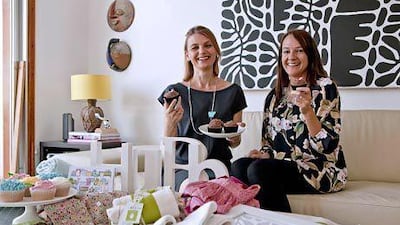The tight-knit community of landscape artists in the Emirates gives rise to more than beautiful surroundings.
That is true for at least two strangers - one from New Zealand, the other from Australia - who met in Dubai for work more than a decade ago.
Anna Bolton-Riley, 37, and Annabelle Fitzsimmons, 38, felt they were not being able to access local, artisan products to take back to their countries as a flavour of their lifestyles here.
Last year, they opened an online retail store that offers a platform to Arabian Gulf-based sellers who produce all manner of things, from toffees to baby clothes, or source artisan products from outside the UAE, such the as India, Africa and Afghanistan.
Called Little Majlis, to denote the interactive nature of the platform, the retail website might seem a local version of American or Australian websites such as Etsy.com and Madeit.com. Launched last October with 10 shops, Little Majlis now has 48 shops and 24 waiting to come on board.
"We started it as a work-life balance that would have a design-focused and community-based service to support people," says Ms Bolton-Riley, who still works full-time as a design manager at the Desert Group in Dubai. "And we came across a whole underground community."
Ms Fitzsimmons, who has two boys aged two and eight, stopped working in 2010 as a senior manager for Jumeirah Golf Estates in Dubai. She made the transition to be able to manage her own hours.
To make sure the two are on the right side of law, the entrepreneurs launched the website after an assurance from Dubai's Creative Zone from where they got their trade licence. The Little Majlis shopkeepers are legally permitted to sell on the website without the need to hold their own trade license if they meet the website's terms and conditions.
"It is really important to encourage start-ups and for them to not have to worry about trade licences," Ms Fitzsimmons says.
Since there is nothing similar to Little Majlis in the region, the two friends are already eyeing expansion. This month Ms Bolton-Riley would leave her full-time job and join their enterprise, and they would start marketing the website in Muscat, Doha and Bahrain towards the end of this year. While 90 per cent of the sellers are based in Dubai, the rest are from Abu Dhabi and Sharjah. Almost 86 per cent of the buyers are from the UAE and 9 per cent from other Gulf countries.
To try to ensure the products are actually handmade and for quality control, sellers are required to send several pictures of a product from different angles, including close-ups.
Moreover, the two entrepreneurs say they know many of the Dubai-based artisans from school fairs, art events and workshops, such as those in Safa Park or at art galleries. So far, they have managed transactions worth a couple of thousand dirhams.
One of the first vendors on the website was Melanie Gissing, who runs Maddy & Eva, a children's clothing line, and Melanie Gissing Design, a women's wear range. While a minority of her income comes through Little Majlis, the rest being face-to-face sales at markets and events and inquiries through her Facebook pages, she wants to stick with the fledgling website.
"It's a great way to facilitate people to buy from you especially who are not in Dubai," she says.
Carole Naim, who owns Beshtar, sells handmade lapis lazuli tableware from Afghanistan on Little Majlis that can cost from Dh170 (US$46.28) to Dh800.
While she joined the platform last year when it launched, she is yet to sell anything through it.
"These are the things you need to give it a bit of time," she says.
Little Majlis makes money by charging commission for each product sold. The nominal listing charge covers a product for four months while it is free to open a shop online on the platform.
"We are not looking to make profit in the net two years," Ms Anna Bolton-Riley says. Started with Dh200,000 of their savings, the big costs have been trade licensing, Web development and payment gateway deposit through Innovate.
There are no active plans to seek external investment.
"We would like to keep it in-house," she says. "It's our baby."

